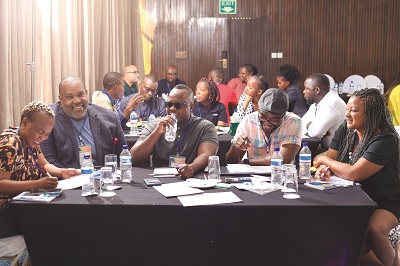By ‘Mamashiya Nts’epeng Ts’ita Tikiso
Zimbabwe – AFRILABS is currently running a workshop intended to capacitate hub managers to run their hubs efficiently. The objective is for hub managers to build the ecosystem in African countries. The workshop was opened by Ms. Nanko Madiu who is the director of programmes for Afrilabs, who gave the summary of the workshop, the goals and objectives to be achieved. From Lesotho, Bam Group Foundation (BGF) representative Mrs Mamashiya Ntsepeng Tsita Tikiso is attending this 5 day AFRILABS capacity building workshop in Zimbabwe which started from the 24th April up to 28th April in Victoria Falls.
The first day session was facilitated by Mr. Lukonga Lindunda who is a Startup Ecosystem Builder, Executive Director and Co-founder of BongoHive Group of Companies, in Zambia, which includes BongoHive Innovations, an award-winning innovation and technology hub changing the landscape of innovation and entrepreneurship in the region. BongoHive Consult is a digital transformation and innovation consulting firm that has Hive Co-working which is a shared workspace facility. He gave detailed insight on how to design effective and relevant venture building programmes for startups, bootcamps, incubators and accelerators for Africa. Incubators incubate very-early stage businesses by helping them convert their ideas into businesses. Accelerators provide a rapid level of business growth to selected startups over a period of a few months. Accelerators ask for startup’s to apply for places, they chose the best through a competitive selection process. Accelerators are usually well funded, provide extensive short-term support, and have links to investors.
IT was discussed how important it is to differentiate the four families of growing businesses as the approach has to be different and tailored for them and this varies per community. These are Livelihood Sustaining Enterprises, Dynamic Enteprises, Niche Ventures, and High Growth Ventures.
The hubs were capacitated that the startup development phases have to be clearly be defined, from ideation, conception, commitment, validation, scaling, and establishing. This clearly affects the type of support required whether it is incubation (which is normally 1 to 5 years) or acceleration (which is normally 3 to 6 months). What is important to note is that more of Lesotho businesses that need support are those that are at formation stage and require Inspiration, key domain knowledge, and coaching to help build the right mindset, understanding and abilities for the journey ahead clearly defining typical issues to avoid or solve, and what steps to take and in what order and any other available support along the way. There are also those Lesotho businesses that need validation which involves initial product development, strengthening core team via mentoring or new team members, supporting team, product validation and customer development. The third faction of Lesotho MSMEs that need attention are those that are at the growth stage. Such businesses need to acquire additional resourcing, growth key performance indicators, creation of processes for scaling various business operations, improving financials and expanding business even internationally.
The second day session was facilitated by Ms. Tadzoka Pswarayi who is a social impact and tech entrepreneur passionate about the development of Africa. She has worked and lived in three continents and has co-founded multiple organisations in Zimbabwe including Dwala, Impact Hub Harare and Masamba Kombucha. Independently, Tadzoka works as an International Development Consultant and researcher in order to scale positive social impact initiatives on issues spanning from youth empowerment and women’s rights, digital literacy, tech education, clean energy to sustainable development. She also represents multiple international organisations. She leads international communities including Facebook Developer Circle and Founders Live Harare and others as their Zimbabwean representative.
Tadzoka’s training session as the facilitator was focused on Communities. She emphasized on the importance of stakeholders and community and impact in within the incubation and acceleration hubs. What was mentioned to be crucial was to analyse the metrics used to qualify success of a programme. This may involve quality and or quality as ultimately what is important is value provided which involves different elements. A lot of hubs facilitators are burning out because they feel they are the ones who have to do everything, whereas there is the community or stakeholders who have to be involved with different roles and purpose. It is therefore important to think of the different types of engagement for different groups and individuals in within the groups. Tadzoka says “If you know the kind of community you want to join, then you create it through your own initiatives”. She clarified the importance of keeping everyone engaged through various activities, be it by having regular sessions with the beneficiaries (or cohorts that the hub takes in through), the mentors, and the funders. Furthermore, there was mention of the importance to support frontline staff who make connections with potential and existing stakeholders hence the need to be equipped such that one is able to talk the values, vision and mission of the hub.
This workshop was well coordinated through the Afrilabs through the facilitation of Ms. Funmilayo Caulcrk who is the senior programmes officer of Afrilabs. The countries represented are Egypt, Lesotho, South Africa, Malawi, Kenya, Zambia, Zimbabwe, Nigeria, Ghana.


